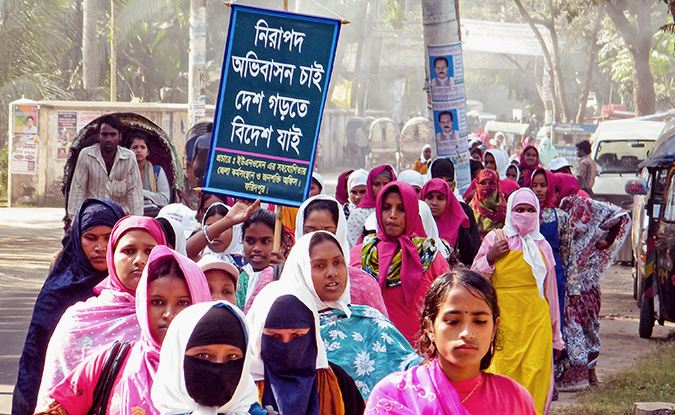Protecting the rights of women migrant workers

In Bangladesh, women make up only 4.12 per cent of all migrant workers. In 2004, it grew to a significant percentage of 18.66 in 2015. The growth however had a slight dip bringing it down to 15.58 and 12.12 per cent respectively in 2016 and 2017.The 7th Five -year Plan envisioned that women will make up to 30 percent of the total number of outbound migrant workers by 2020.
Since 2006 UN Women Bangladesh is working to empower and promote the rights of women migrant workers in collaboration with Ministry of Expatriates’ Welfare and Overseas Employment (MOEWOE), Bureau of Manpower, Employment and Training (BMET) and UN agencies such as ILO and IOM. We work for better protection of the rights of migrant workers throughout the migration cycle through improvements in policies and services for women migrant workers.
At the policy level, UN Women is contributing gender-perspectives, emphasizing the rights of women migrant workers, and ensuring participation of women’s rights groups in the regional and global normative process including Colombo Process, Abu Dhabi Dialogue and GFMD. At the national level, we are advocating for adopting and implementing gender responsive elements of Standard Terms of Employment (STOE) for Women Domestic Migrant Workers (WDMWs) by the Government of Bangladesh in its negotiation with labour receiving countries. UN Women is also supporting MOEWOE with identification of higher-value occupations and safer migration destinations for women so that they have more options for a safer and empowering migration experience.
In terms of services, UN Women in partnership with ILO is supporting BMET to improve effectiveness of pre-departure trainings for female migrant workers. In addition, Labor Attachés, BMET and District Employment and Manpower office (DEMO) officials have been sensitized on the needs and vulnerabilities of women migrant workers to be able to provide better services and information to women and support their safe migration.
UN Women also supports community-level interventions. Popular street theatre and radio programmes have been developed to spread information on safe migration to potential migrant workers and help them make better decisions on whether to migrate or not and how. Approximately 15,000 people have been reached by these messages on the risks of illegal migration and the opportunities and pathways to legal migration. Under a reintegration programme, a total of 24,554 (male 13,451 and female 11,103) people were sensitized through courtyard meetings on the challenges faced by women who migrate abroad for work and the contributions that they make to the Bangladesh economy through remittances, in order to reduce the social stigma that women migrants face when they return to their community.